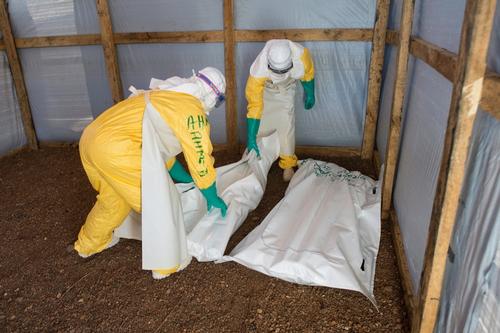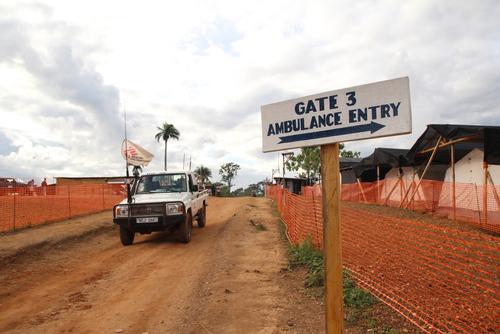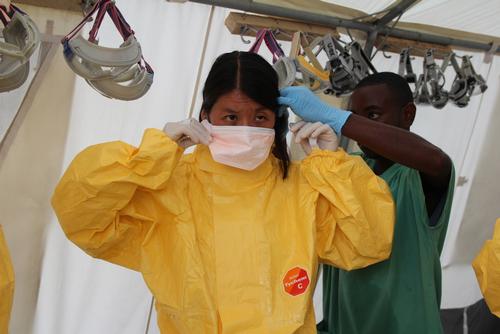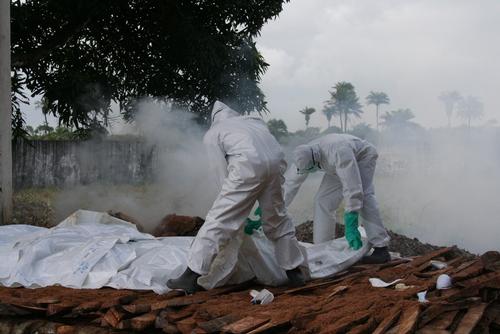In a tragic week for MSF and the communities in West Africa, between 20 and 24 August, we sadly lost three colleagues - a Guinean outreach worker, a Liberian nurse and a Sierra Leonean nurse. All passed away working in the fight against Ebola – their bravery and generosity of spirit will be always remembered. Our deepest sympathies are with their families and friends during this very difficult period.
An MSF communications officer arrived in Liberia only days before the loss of Eric, a 36 year-old Liberian nurse. In recognition of Eric’s tireless devotion to help his own community afflicted by the virus, he recounts here his story.
Eric’s last walk
“Ebola is real,” says Johnson-Boie to the residents of Yassadou, a small village of around 300 people, hidden in the forested highlands of northern Liberia. “And Ebola can kill you, just like it killed my big brother Eric,” he continues. The crowd nods, cross-armed. The entire village has come to the concrete yard of the town hall. They have come to attend Eric’s funeral. “Eric was a very strong guy just like our great-grandfather, a Sudanese warrior who came to Liberia,” says Johnson-Boie. “But not strong enough…”
Eric died fighting
Earlier that day Johnson-Boie visited the Case Management Centre (CMC) in Foya where Ebola infected patients and Ebola suspected patients are treated by Médecins Sans Frontières/Doctors Without Borders (MSF).
For the last time, Johnson-Boie wants to see the body of his 36-year-old brother before he is laid into his coffin. Before contracting the disease, Eric had been allocated by the Liberian Ministry of Health to work as head nurse in the CMC.
“He loved this job despite the risks,” Johnson-Boae says. “Eric was one of the first staff in all of Liberia that had been trained in dealing with Ebola patients”, says Washington, his colleague from the CMC. “He was very committed and hard working.”
As an experienced nurse, Eric’s death shook everybody in the CMC. “It will be more than a gap that he is leaving behind,” says Washington. “He was very caring, loving and social with the patients. He made them smile and encouraged them.” Despite doctors and nurses trying everything they could, Eric died on 23rd August 2014. He died fighting this deadly disease, as roughly 100 other health workers have in West Africa since the outbreak.
“Let’s believe that Ebola is real”
As the MSF car carries Eric’s body from Foya to Yassadou, we pass by several villages. People stop, throw their hands above their heads and cry out loudly. “They know what happened,” says Johnson-Boie. More and more motorbikes follow the car and soon a honking convoy makes its way over the bumpy road, surrounded by tall elephant grass. The closer we get to Yassadou, the stronger the grief becomes.
When we arrive at Eric’s resting place, we reach a climax. The entire village is upset; screaming and sobbing, some run around with their arms in the air. Some drop to the floor and writhe in the dust. These are images that burn into the brain. The parish priest begins to pray: “God, may you help us to understand the concept of this terrible disease. We cannot do much for Eric anymore. He is in your arms now. May Eric rest in peace. Amen.” He then turns to the residents of Yassadou: “What you can do now is protect yourself. Let’s believe that Ebola is real.”
Avoiding further losses
Before the burial starts local MSF health promoter Baneth explains to the villagers what Ebola is. He also talks about its transmission routes, how to prevent sickness and what to do if anybody shows any symptoms. Johnson-Boie becomes emotional. “Listen to this man,” he pleads to the people of Yassadou. “Eric was not infected in the hospital. Now we need to find out how and where it came from, to avoid more losses in our community.
“So much wrong information is spreading around in Liberia. Ebola is not airborne transmitted and salty water or oil cannot prevent you from it. We don’t know where these false messages are coming from, but please stop believing them.”
Protocol for a safe burial
In a touching speech he thanks MSF for their work and effort: “No words can express our gratitude for what you have done for Liberia,” he says. “We wish you could have been here during the first peak of the outbreak already.”Women start chanting while MSF hygienists take Eric’s coffin out of the car. One member of staff ceaselessly sprays chlorine solution on the caretakers, their gloves and their boots. Health promoter Baneth is guiding the caretakers step by step through the protocol of a safe burial to avoid any further risk of contamination.
Many metres away the men are staring at the MSF staff in their yellow plastic bodysuits, gloves and facial masks. Some are covering their mouths to protect themselves from the smell. As the coffin is put slowly into the freshly dug earth, raindrops pour down. Johnson-Boie grabs a shovel and silently covers his brother’s grave with wet earth.







